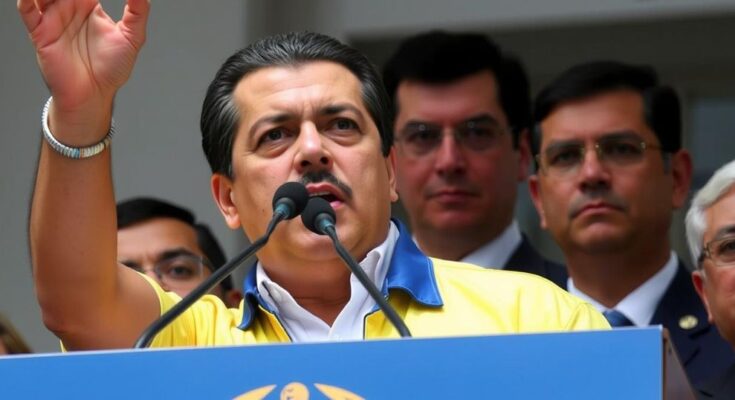Venezuelan President Nicolas Maduro is set to take an oath for a third term, despite public outcry over alleged election fraud. Opposition leader Maria Corina Machado was briefly detained after leading protests against the government. International leaders, including President-elect Donald Trump, condemned her detention, while other countries expressed disapproval of Maduro’s regime. The ongoing political crisis highlights the struggle for democracy in Venezuela, characterized by repression and international concern.
On Friday, Venezuelan President Nicolas Maduro was set to take an oath for a third term amidst widespread protests and criticism regarding the legitimacy of the recent elections. The opposition leader Maria Corina Machado, who had emerged from hiding to lead demonstrations in Caracas, was reportedly apprehended shortly after a rally, igniting further international condemnation of Maduro’s regime. Although the government denied detaining Machado, accounts from her team assert that she encountered security forces following the protest, where witnesses reported gunfire and her forced removal from a motorcycle convoy.
International reactions to Machado’s detention were swift, with U.S. President-elect Donald Trump labeling her and another opposition figure as “freedom fighters” and asserting that they must remain safe. Other nations, including Ecuador and Colombia, condemned the Maduro administration’s actions, with the latter specifically criticizing the ongoing harassment of Machado. Italy’s Prime Minister also condemned the repression in Venezuela, emphasizing a commitment to supporting the aspirations of the Venezuelan populace for democracy. Meanwhile, Maduro’s government appeared to be tightening their grip on opposition voices, with fresh arrests surfacing ahead of his inauguration.
Maduro, who has held power since 2013 following Hugo Chavez’s death, continues to maintain control through a combination of state power and international allying, particularly with Russia and Cuba. His previous election win in 2018 was similarly deemed illegitimate by many, leading to ongoing protests characterized by violence and repression. Amidst calls for democracy, thousands of military supporters rallied in favor of Maduro, seeking to reinforce his position against dissenting voices and ensuring the continuity of their rule amidst increasing global scrutiny and opposition demands for reform.
Nicolas Maduro’s presidency has faced widespread allegations of election fraud, repression, and human rights abuses since he ascended to power in 2013. His re-election in 2018 was condemned as undemocratic, exacerbating political tensions within the country. Currently, Venezuela is experiencing severe domestic turmoil with economic collapse, leading to significant humanitarian crises, and widespread protests against the government’s actions. The international community has expressed increasing concern over the political situation, particularly regarding the treatment of opposition leaders and the overall democratic landscape in the nation. Amidst these challenges, Maduro has managed to maintain control through a combination of military loyalty and suppression of dissent.
In summary, the political landscape in Venezuela remains fraught with tension as President Maduro prepares for another term amidst allegations of election fraud and suppression of opposition figures. Maria Corina Machado’s recent detention has sparked renewed outrage both domestically and internationally, emphasizing the ongoing struggle for democracy in Venezuela. As protests continue and global scrutiny intensifies, the Maduro regime finds itself increasingly isolated in its persistence against dissent and demand for political reform.
Original Source: www.cbsnews.com




